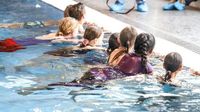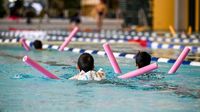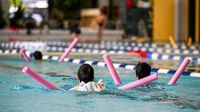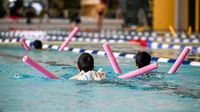In a significant ruling, the administrative court in Freiburg rejected a lawsuit from parents seeking to exempt their children from mandatory school swimming lessons due to their religious beliefs. The court's decision, announced on April 16, 2025, stems from a case involving members of the Palmarian Church, a small Christian sect that advocates strict dress codes and prohibits its followers from engaging in activities deemed inappropriate according to their faith.
The parents, who belong to the Palmarian Church, argued that entering a swimming pool would be a "mortal sin" under their religious tenets. The 36-year-old mother expressed her beliefs during the court proceedings, stating, "Even if I were to enter a swimming pool, I would commit a mortal sin." This reflects the church's stringent guidelines, which forbid tight-fitting clothing and swimming attire such as burkinis, as members are expected to dress modestly and avoid places with what they term "shameless displays."
The court's ruling emphasized the state's educational mandate and the integrative function of schools, asserting that the right of parents to provide religious education does not supersede the state's obligation to ensure that children participate in school activities. According to the Freiburg Regional Council, the state's view was affirmed, indicating that the educational rights of the state must prevail in this instance.
The Palmarian Church, which split from the Roman Catholic Church in 1978, claims to be the "only and true Church of Christ" and operates with its own papal authority. Its headquarters is located in El Palmar de Troya, Spain, where the church has reported apparitions of the Virgin Mary and other heavenly messages since 1968. The court's decision does not yet carry legal finality, as the plaintiffs from Tuttlingen have the option to appeal to the Baden-Württemberg Administrative Court in Mannheim.
During the hearing, it was revealed that the dispute over swimming lessons began in 2021 and initially involved three children. However, two of the children no longer attend the school, leaving only one child whose case was to be adjudicated. The court acknowledged this change in circumstances, indicating that the focus had shifted to a single child.
The parents maintained that their children participate in other school activities, including sports, but outside of school, their interactions are limited to peers who adhere to the church's dress code, which includes specific clothing requirements such as skirts for girls and long-sleeved, high-necked garments.
Judge Gabriele Kraft-Lange, who presided over the case, noted the complexity of the situation, stating, "Here, fundamental rights are colliding." This highlights the ongoing tension between religious freedom and the state's educational responsibilities. Similar cases in the past have involved Muslim students and their families seeking exemptions from mixed-gender swimming classes, with courts generally upholding the requirement for participation as long as provisions for modest swimwear, like burkinis, are available.
In a landmark ruling by the Federal Administrative Court in 2013, it was determined that Muslim girls could be expected to attend swimming lessons alongside boys, provided they had the option to wear a burkini. The European Court of Human Rights echoed this sentiment in 2017, ruling on a case involving a Muslim girl from Switzerland, reinforcing the idea that educational participation is paramount.
The Freiburg court's decision is significant not only for the families involved but also for the broader discussion surrounding religious exemptions in educational settings. As societal norms evolve and the diversity of religious beliefs in Germany continues to grow, cases like this one will likely prompt further legal scrutiny and debate.
In summary, the court's ruling underscores the delicate balance between respecting individual religious beliefs and upholding the state's duty to provide comprehensive education. The parents have one month to consider their options for appeal, and if pursued, the case will advance to the higher court, potentially setting a precedent for future disputes of this nature.









